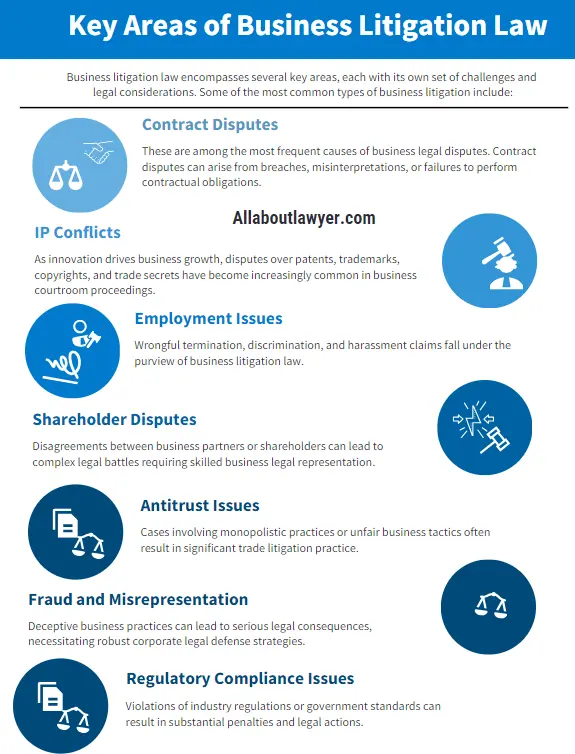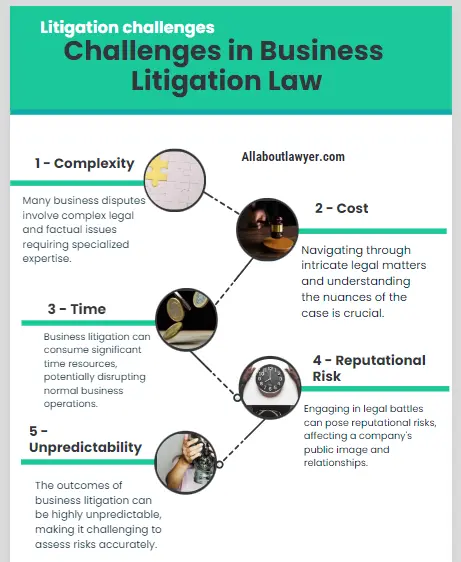Understanding Business Litigation Law Key Concepts and Strategies in Corporate Legal Battles Guide By All About Lawyer
Business litigation law is a crucial aspect of the legal system that deals with commercial dispute resolution and corporate legal conflicts. This specialized area of law encompasses a wide range of issues that arise in the business world, from contract disputes to intellectual property infringement. As companies engage in various transactions and relationships, the potential for legal disputes increases, making business litigation an essential field for both legal professionals and business owners to understand. In this article we will discuss what is business litigation law, Its role in business, and its future.
Table of Contents
Defining Business Litigation Law
At its core, business litigation law involves the legal processes and procedures used to resolve disputes between businesses or within a business entity. This field of law covers a broad spectrum of commercial legal actions and trade conflict adjudications. It is the arena where corporate lawsuit handling and enterprise legal proceedings take place, often involving complex legal strategies and extensive resources.
Key Areas of Business Litigation Law
Business litigation law encompasses several key areas, each with its own set of challenges and legal considerations. Some of the most common types of business litigation include:
1. Contract Disputes
These are among the most frequent causes of business legal disputes. Contract disputes can arise from breaches, misinterpretations, or failures to perform contractual obligations.

2. Intellectual Property Conflicts
As innovation drives business growth, disputes over patents, trademarks, copyrights, and trade secrets have become increasingly common in business courtroom proceedings.
3. Employment Issues
Wrongful termination, discrimination, and harassment claims fall under the purview of business litigation law.
4. Partnership and Shareholder Disputes
Disagreements between business partners or shareholders can lead to complex legal battles requiring skilled business legal representation.
5. Antitrust and Unfair Competition
Cases involving monopolistic practices or unfair business tactics often result in significant trade litigation practice.
6. Fraud and Misrepresentation
Deceptive business practices can lead to serious legal consequences, necessitating robust corporate legal defense strategies.
7. Regulatory Compliance Issues
Violations of industry regulations or government standards can result in substantial penalties and legal actions.
The Process of Business Litigation
Business litigation typically follows a structured process, though the specifics can vary depending on the nature of the dispute and the jurisdiction. The general stages of business litigation include:
1. Pre-litigation Assessment:
Before filing a lawsuit, parties often engage in a thorough evaluation of the dispute, considering potential outcomes and alternative resolution methods.
2. Filing the Complaint:
The litigation process formally begins when one party files a complaint with the court, outlining their grievances and desired remedies.
3. Response and Counterclaims:
The defendant responds to the complaint, potentially filing counterclaims against the plaintiff.
4. Discovery:
This crucial phase involves the exchange of relevant information between parties, including document production, depositions, and interrogatories.
5. Pre-trial Motions:
Lawyers may file various motions to resolve issues before trial or to shape the parameters of the case.
6. Settlement Negotiations:
Many business disputes are resolved through negotiations before reaching trial, often facilitated by mediators or arbitrators.
7. Trial:
If a settlement is not reached, the case proceeds to trial, where each side presents evidence and arguments before a judge or jury.
8. Post-trial Motions and Appeals:
After a verdict, parties may file post-trial motions or appeal the decision to a higher court.
The Role of Business Litigation Attorneys
Business litigation attorneys play a crucial role in navigating the complex landscape of corporate legal battles. These legal professionals specialize in commercial case management and are adept at handling various aspects of business dispute settlement. Their responsibilities include:
1. Case Evaluation:
Assessing the merits of a case and advising clients on potential outcomes and strategies.
2. Legal Strategy Development:
Crafting comprehensive litigation strategies tailored to the specific needs and goals of the client.
3. Negotiation and Settlement:
Engaging in settlement discussions to resolve disputes efficiently and cost-effectively.
4. Courtroom Representation:
Advocating for clients in court, presenting arguments, and examining witnesses.
5. Risk Management:
Advising businesses on preventative measures to minimize legal risks and avoid future litigation.
Alternative Dispute Resolution in Business Litigation
While traditional courtroom battles are often associated with business litigation, alternative dispute resolution (ADR) methods have gained prominence in recent years. These methods offer more flexible, cost-effective, and often quicker resolutions to business conflicts. Common ADR approaches in business litigation include:
1. Mediation:
A neutral third party facilitates negotiations between the disputing parties to reach a mutually agreeable solution.
2. Arbitration:
An impartial arbitrator or panel hears both sides of the dispute and makes a binding decision.
3. Negotiation:
Direct discussions between parties or their representatives to resolve the conflict without third-party intervention.
4. Collaborative Law:
A cooperative approach where parties and their attorneys work together to resolve the dispute without court involvement.
The Impact of Technology on Business Litigation
Advancements in technology have significantly influenced the practice of business litigation law. Some key technological impacts include:
1. E-Discovery:
Electronic discovery has revolutionized the way evidence is gathered and analyzed in business legal contests.
2. Artificial Intelligence:
AI tools are increasingly used for document review, case prediction, and legal research in commercial lawsuit handling.
3. Virtual Courts:
The rise of remote hearings and virtual courtrooms has changed the landscape of business court proceedings.
4. Blockchain:
This technology is impacting contract enforcement and providing new forms of evidence in business legal disputes.
Challenges in Business Litigation Law
Business litigation presents several challenges for both attorneys and their clients:
1. Complexity: Many business disputes involve intricate legal and factual issues requiring specialized knowledge.
2. Cost: Litigation can be expensive, with costs potentially outweighing the value of the dispute.
3. Time: Business litigation can be time-consuming, potentially disrupting normal business operations.
4. Reputational Risk: Public legal battles can damage a company’s reputation and relationships.
5. Unpredictability: Outcomes in litigation are often uncertain, making risk assessment challenging.

The Future of Business Litigation Law
As the business world evolves, so too does the field of business litigation law. Emerging trends include:
1. Increased Focus on ADR:
Growing emphasis on alternative dispute resolution methods to avoid costly and time-consuming trials.
2. Specialization:
More attorneys are focusing on specific industries or types of business disputes.
3. Globalization:
Cross-border disputes are becoming more common, requiring knowledge of international law.
4. Regulatory Changes:
Evolving business regulations are likely to create new areas of litigation.
5. Technology Integration:
Continued adoption of technology in legal practice and dispute resolution.
Conclusion
Business litigation law is a dynamic and complex field that plays a crucial role in resolving commercial disputes and maintaining the integrity of business relationships. Understanding the fundamentals of business litigation, including its processes, key areas, and emerging trends, is essential for businesses and legal professionals alike. As the business world continues to evolve, so too will the practice of business litigation law, adapting to new challenges and opportunities in the ever-changing commercial landscape.
FAQs
Q: What is the difference between business litigation and commercial litigation?
A: While often used interchangeably, business litigation typically refers to disputes involving businesses of all sizes, while commercial litigation may focus more on larger, complex commercial transactions. However, in practice, these terms largely overlap and cover similar types of legal disputes in the business world.
Q: How long does a typical business litigation case take to resolve?
A: The duration of a business litigation case can vary widely depending on its complexity, the parties involved, and the court’s schedule. Simple cases might be resolved in a few months, while complex litigation can take several years. Many factors influence the timeline, including the discovery process, motion practice, and potential appeals.
Q: What are the costs associated with business litigation?
A: Costs in business litigation can be substantial and may include attorney fees, court costs, expert witness fees, and expenses related to discovery and document production. The total cost can range from thousands to millions of dollars, depending on the case’s complexity and duration. Many businesses weigh these potential costs against the value of the dispute when deciding whether to pursue litigation.
Q: Can business litigation be avoided?
A: While not all disputes can be prevented, businesses can take steps to minimize the risk of litigation. These include:
– Drafting clear, comprehensive contracts
– Implementing strong internal policies and procedures
– Addressing potential conflicts early through negotiation
– Using alternative dispute resolution methods when appropriate
– Maintaining good communication with business partners and employees
Q: What is the role of a business litigator?
A: A business litigator is an attorney who specializes in representing clients in business-related legal disputes. Their role includes:
– Evaluating the merits of a case
– Developing legal strategies
– Representing clients in court proceedings
– Negotiating settlements
– Advising on risk management and dispute prevention
Business litigators may work on both the plaintiff and defense sides of cases, depending on their clients’ needs.
About the Author

Sarah Klein, JD, is a former civil litigation attorney with over a decade of experience in contract disputes, small claims, and neighbor conflicts. At All About Lawyer, she writes clear, practical guides to help people understand their civil legal rights and confidently handle everyday legal issues.
Read more about Sarah
